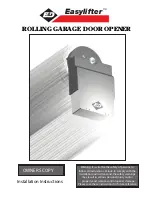
6550-065-A-4-12
21
LED
Test the operator reversing sensitivity:
Dual Operators:
1
2
Place an immobile object along the gate path, allowing the gate to strike it while in the
open
and
close
cycles. The gate must
reverse direction after striking the object. If it does not, increase the reverse sensitivity and repeat this testing until the correct
sensitivity has been achieved in
BOTH
directions. The operator will assume a soft shutdown (Hold the auto-close timer) after
striking and reversing the gate which will require pressing the “
Push to Operate
” button to cycle the operator again.
3
Adjust reverse sensors for each operator when dual operators have been installed.
Secondary
Primary
Primary
Max
Sensitivity
3.4 Inherent Reverse Sensors Adjustment
This vehicular gate operator is equipped with an inherent adjustable reversing sensor (Type A) used as the primary entrapment
protection system according to UL 325 standards.
The gate will reverse direction after “physically” encountering an
obstruction in either the opening or closing gate cycle
.
If the Auto-Close Timer (DIP-switch SW 1, switch 4) is ON and the gate physically encounters an obstruction during the
CLOSING
cycle, it will reverse to the open position and
HOLD
the gate at this position (Soft shutdown condition). Another input
command is needed before the gate will reset and close again.
For the reverse sensors to function correctly,
THE HUB MUST NOT SLIP
when the gate encounters an obstruction. The gate
must be properly installed and work freely in both directions. A good set of roller bearing hinges is essential for proper swing
gate operation.
For the reverse system to function correctly, the gate must be properly installed and work freely in both directions and
the limit
sensors must be properly adjusted BEFORE adjusting the reverse sensors
. The ideal adjustment will allow the operator to
move the gate through its entire travel cycle without reversing, but will reverse upon contact with an obstruction with no more
than 40 Lbs of force. This force can be measured with a gate scale, P/N 2600-225.
PUSH
TO
OPERA
TE
technician use only
PUSH
TO
OPERA
TE
technician use o
nly
Note: “
Push to Operate
” button will use the
Auto-Close timer if turned ON (SW 1, switch 4
ON
).
Note: The LED will turn
on briefly when AC
power is turned on.
CAUTION:
Keep pedestrians and vehicles clear of the gate while adjusting and testing sensors!
Note:
If the minimum or maximum reverse sensor sensitivity adjustment is
reached and the
Secondary Operator
will not reverse properly, the Secondary
Operator Current Sensor’s wire turns will have to be altered.
See 3.5 Secondary Current Sensor Adjustment on the next page.
Safety Note:
The LED will
remain ON after a cycling gate
gets obstructed during normal
operation to indicate that the
reverse sensor has been tripped.
Always check the gate area for
possible obstructions before
putting operator back in service.
While gate is opening, slowly rotate the primary reverse sensor clockwise until the LED
lights up and the gate reverses direction. Rotate the primary reverse sensor back
counter-clockwise approximately 1/8 turn to decrease the sensitivity (LED will turn off).
Press the “
Push to Operate
” button and
CLOSE
the gate.
Make sure the gate closes completely. If it reverses and
opens (LED will turn on), rotate the primary reverse
sensor counter-clockwise a little more to decrease the
reverse sensitivity (LED will turn off).
Cycle the gate a few times to be sure that it cycles completely in both directions,
adjusting the primary sensor as necessary.
Press the “
Push to Operate
” button to
OPEN
the gate.
Min
Note: The LED will light up during the first seconds of gate travel.
Wait until it turns off before adjusting the reverse sensor.
Summary of Contents for Series 6550
Page 2: ......
















































